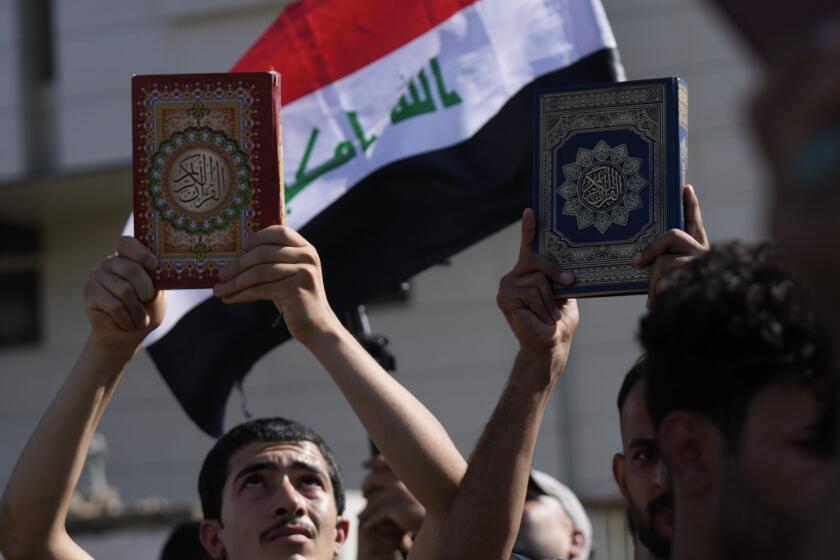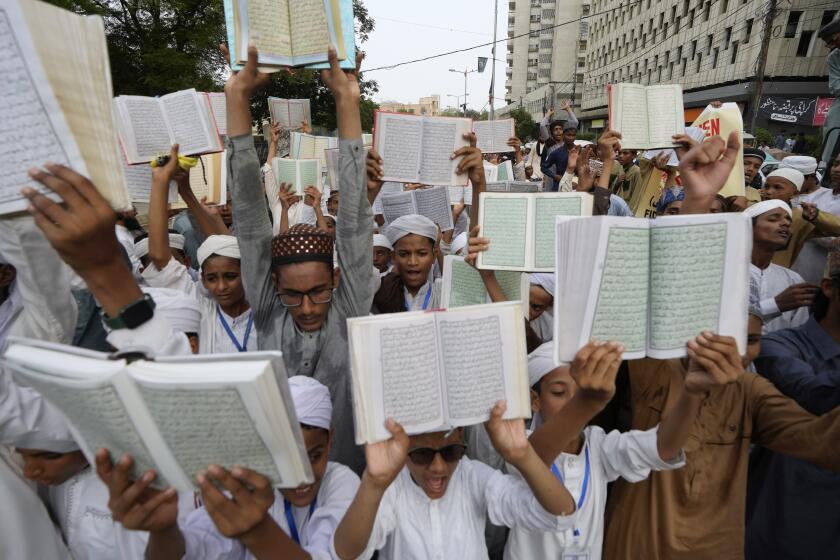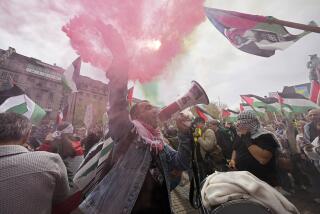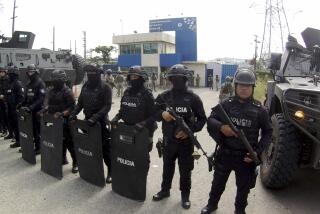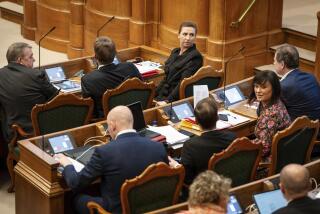Thousands in the Muslim world take to the streets to express outrage over Quran desecration in Sweden
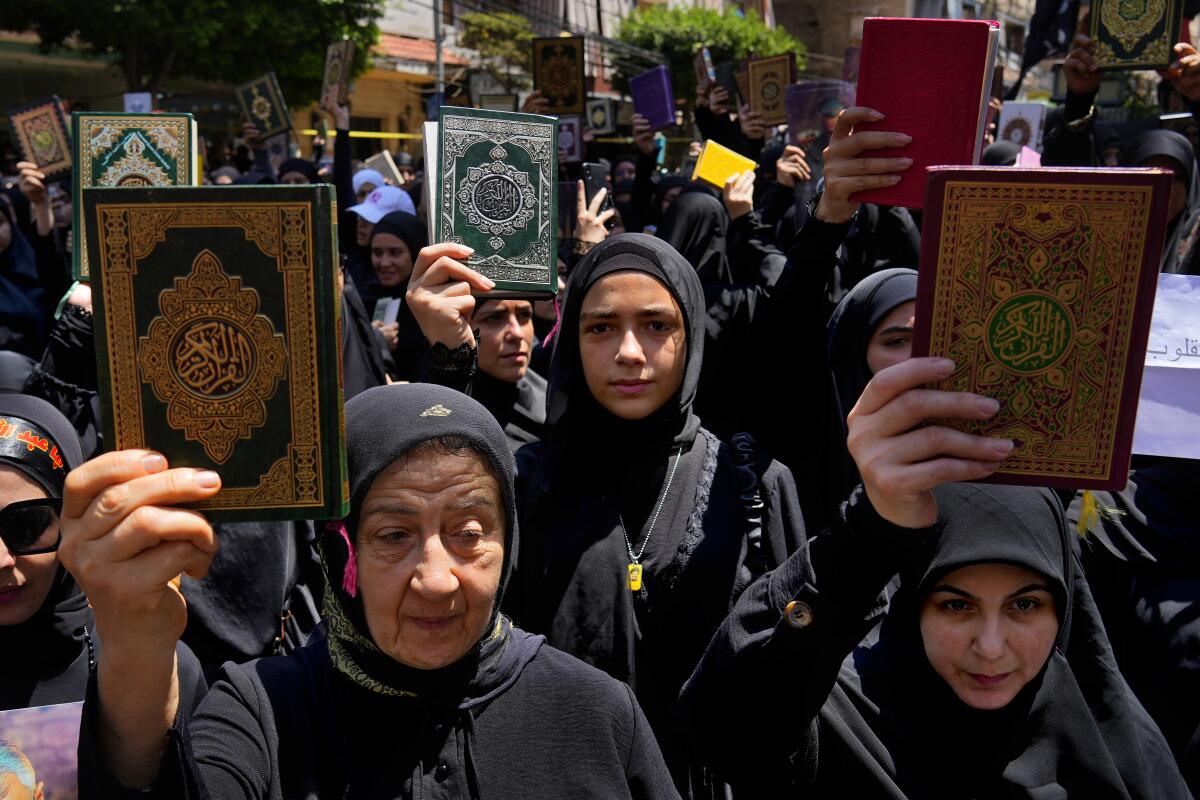
- Share via
BEIRUT — Thousands of people took to the streets in a handful of Muslim-majority countries Friday to express their outrage at the desecration of a copy of the Quran in Sweden, a day after protesters stormed the country’s embassy in Iraq.
The protests in Iraq, Lebanon and Iran that followed weekly prayers were controlled and peaceful, in contrast to scenes in Baghdad on Thursday, when demonstrators occupied the Swedish Embassy compound for several hours and set a small fire.
The embassy staff had been evacuated before the storming, and Swedish news agency TT reported that they were relocated to Stockholm for security reasons.
For Muslims, any desecration of the Quran, their holy text, is abhorrent.
Under scorching heat Friday, thousands gathered in Baghdad’s Sadr City, a stronghold of influential Iraqi Shiite cleric and political leader Muqtada Sadr, some of whose followers took part in the attack on the Swedish Embassy. They brandished Qurans, burned the Swedish flag and the LGBTQ rainbow flag and chanted, “Yes, yes to the Quran, no, no to Israel.”
Iraqi Prime Minister Mohammed Shia al Sudani had called on protesters and security forces to ensure that the demonstrations remained peaceful.
In the southern suburbs of Beirut, thousands more gathered at a protest called by the Iran-backed militia and political party Hezbollah, also brandishing copies of the holy book and chanting “with our blood, we protect the Quran.” Some burned Swedish flags.
Protesters angered by the burning of a copy of the Quran stormed the Swedish Embassy in Baghdad, breaking into the compound and starting a small fire.
Hezbollah leader Hassan Nasrallah in a video address Thursday night called on Muslims to demand their governments expel Sweden’s ambassadors. Iraq cut diplomatic ties with Sweden earlier that day.
“I invite brothers and sisters in all neighborhoods and villages to attend all mosques, carrying their Qurans and sit in them, calling on the state to take a stance toward Sweden,” Nasrallah said in the address, according to Lebanon’s state-run National News Agency.
In Iran, thousands marched in Tehran and other cities across the country, demonstrations that were aired on state television. In the capital, protesters gathered in the city center, shouting: “Death to the Americanized Sweden! Death to Israel! Death to enemies of the supreme leader!”
“The Quran talks to humans all the time, and its voice will never be stopped,” protester Fatemeh Jafari said. “Until the end of the world, the Quran will stay there and will be usable. They can never destroy Quran! Even if they burn it, we will stand by it!”
The demonstrations come after Swedish police permitted a protest Thursday in which an Iraqi of Christian origin living in Stockholm — now a self-described atheist — threatened to burn a copy of the Quran. In the end, the man kicked and stood on the holy book outside of the Iraqi Embassy. He gave similar treatment to an Iraqi flag and to photos of Sadr and of Iran’s supreme leader Ayatollah Ali Khamenei.
A Quran burning and requests for protests to destroy holy books, including the Bible, leave Sweden torn between free speech and respect for religious minorities.
The right to hold public demonstrations is protected by the constitution in Sweden, and blasphemy laws were abandoned in the 1970s. Police generally give permission based on whether they believe a public gathering can be held without major disruptions or safety risks.
The reaction in Iraq was particularly virulent, although no embassy staff were injured since none was present. After protesters left the embassy, diplomats closed it to visitors without specifying when it would reopen.
The state-run Iraqi News Agency reported that some 20 people were arrested in connection with the storming of the embassy. Among those arrested were an Associated Press photographer and two Reuters staff who were covering the protests. The detained journalists were released hours later without charges, following an order from the prime minister’s office.
Sudani, the Iraqi prime minister, ordered the expulsion of the Swedish ambassador and the withdrawal of the Iraqi charge d’affaires from Sweden.
Leaders in several Muslim-majority countries condemned the desecration of the Quran and summoned diplomats from Sweden to express their outrage. Iranian Foreign Minister Hossein Amirabdollahian wrote a letter to the United Nations secretary-general, while Pakistani Prime Minister Shehbaz Sharif called on the 57-nation Organization of Islamic Cooperation to play a “historic role in expressing the sentiments of Muslims and stopping this demonization.”
Meanwhile, the Swedish Foreign Ministry conveyed to the Iraqi charge d’affaires that the storming of the embassy was “completely unacceptable,” according to the TT agency.
Thursday’s Quran desecration was the second to involve the Iraqi man in Sweden, identified as Salwan Momika. Last month, a man identified by local media and on his social media as Momika burned a Quran outside a Stockholm mosque during the major Muslim holiday of Eid al-Adha, triggering widespread condemnation in the Islamic world.
Quran burnings in the past have sparked protests across the Muslim world, some turning violent. In Afghanistan, the Taliban suspended all the activities of Swedish organizations in the country in response to the recent Quran burning.
A similar protest by a far-right activist was held outside Turkey’s Embassy in Stockholm earlier this year, complicating Sweden’s efforts to persuade Turkey to let it join NATO.
In June, protesters who support Sadr stormed the Swedish embassy in Baghdad over that Quran burning.
Worshippers gathering for Friday prayers at the Stockholm mosque outside of which last month’s Quran-burning took place expressed frustration that Swedish authorities allowed such actions. Imam Mahmoud Khalfi said the situation made him feel “powerless.”
“You expect politicians and decision makers and police to show understanding … and try to find a solution. But it hasn’t happened, unfortunately,” he said.
He noted that other countries, such as neighboring Finland, had found a way to combine freedom of speech with respect for religion. Unlike Sweden, Finland still has blasphemy laws.
“To let these extremists and criminals abuse the law and jeopardize peace in society and national security and Sweden’s reputation in the world, that is unsustainable,” he said. “We cannot understand why these lunatics are allowed to run wild.”
At the same time he added, “We are against all violent reactions and we have called on our members, to Muslims in Sweden, to react and act ... in a peaceful way.”
Associated Press writers Jon Gambrell in Dubai; Ali Jabar in Baghdad; Karl Ritter and David Keyton in Stockholm; Nasser Karimi in Tehran; and Munir Ahmed in Islamabad, Pakistan, contributed to this report.
More to Read
Sign up for Essential California
The most important California stories and recommendations in your inbox every morning.
You may occasionally receive promotional content from the Los Angeles Times.
